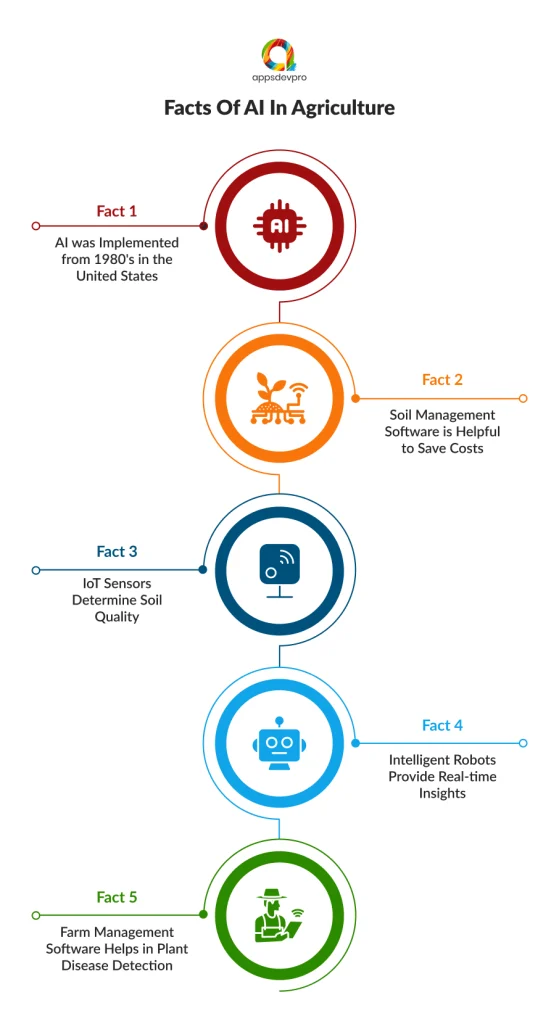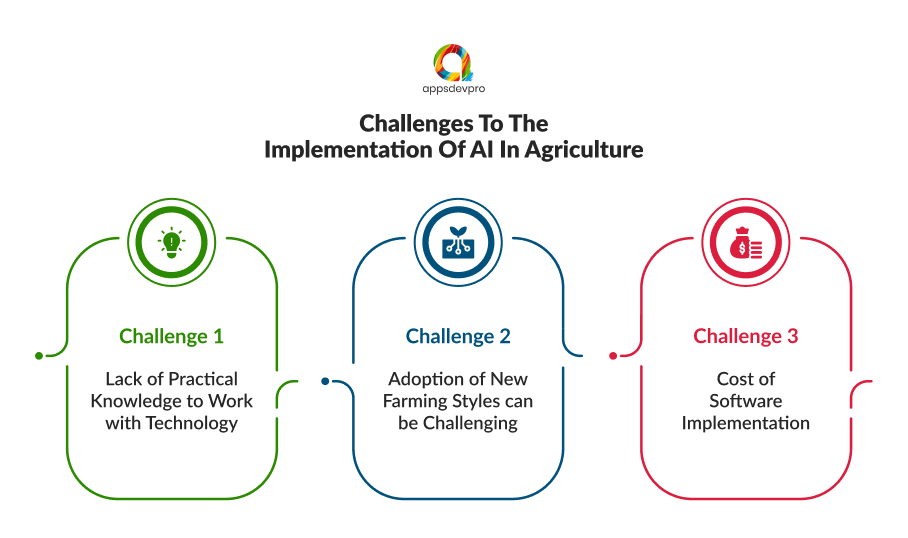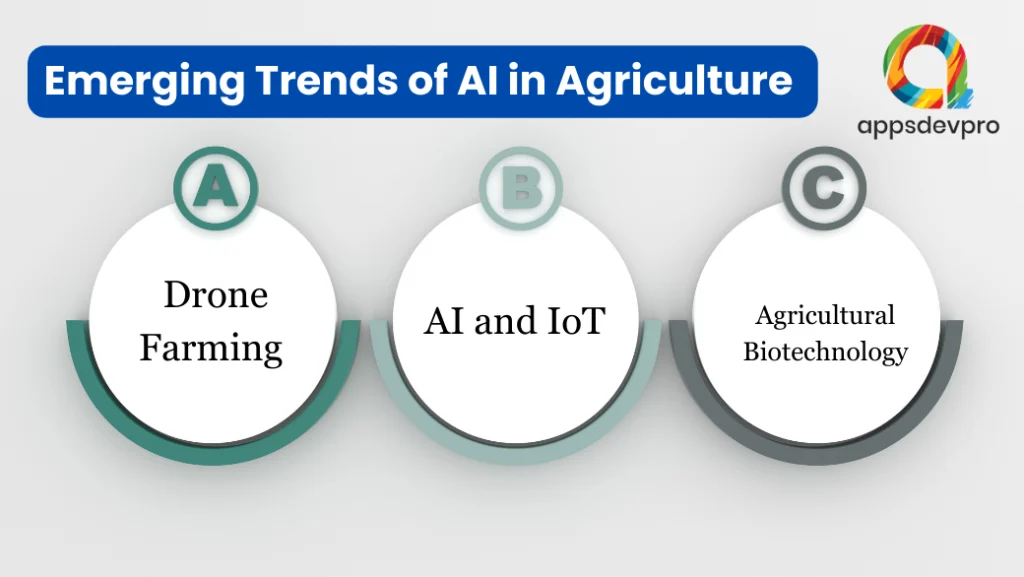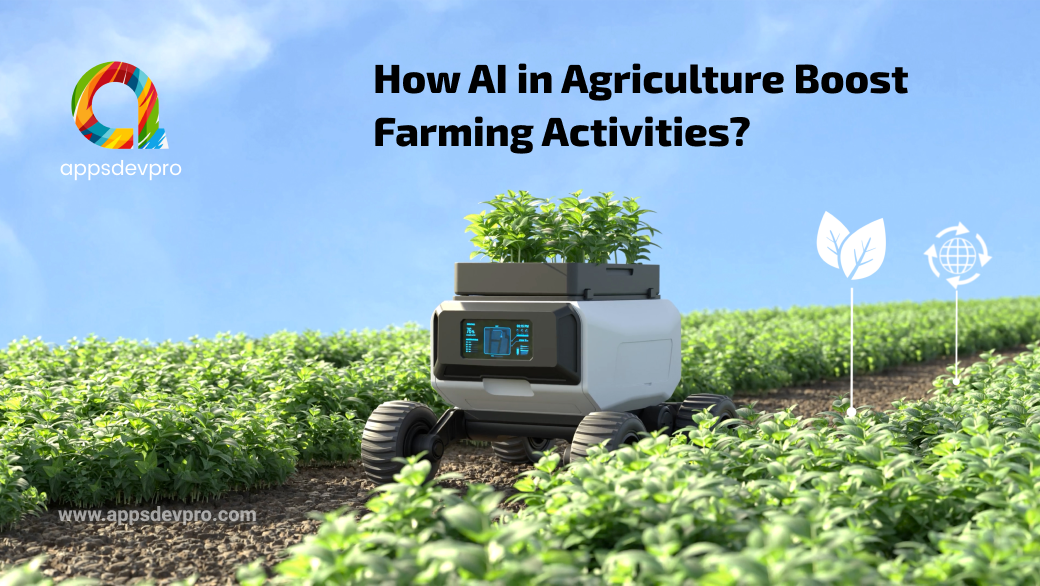Start your dream project?
We have a TEAM to get you there.Business growth can be analyzed when implementing AI in agriculture rather than using traditional farming methods. The world is experiencing digital transformation then it might have calculated benefits, right? Thus, AI integration is efficacious for enterprises when seeking to maximize revenue.
By 2028, AI in the Agriculture market is expected to grow to $4.7 Billion. The reason that is shared by the researchers is that the population is growing rapidly. By 2050, the food requirement will be increased by 60% which is why technology implementation in Agribusinesses is required.
This analysis has promoted efficient farming activities such as crop monitoring AI, detecting nutrient deficiencies, and water stress allowing for precise intervention. Moreover, AI-driven solutions can predict pest attacks, enabling proactive pest control measures, thus safeguarding crops and reducing the need for chemical pesticides.
Use of AI in Agriculture
The video shared knowledge about the benefits and applications of AI in Agriculture. The information is useful for understanding that agribusinesses can consider business growth by integrating technology into existing farming activities.
Want to Build Farm Management Software? Hire Developers who have relevant experience in developing robust web and mobile applications.
Let us begin the blog by first understanding the facts associated with artificial intelligence in agriculture.
7 Interesting Facts of AI in Agriculture to Know for 2024
One thing is for sure technology has improved how farming activities are performed. Quality control, managing crop production, pest control, and more activities are enhanced.

Here are some of the crucial facts that enterprises must know to enhance their work processes.
- In the late 1980s, artificial intelligence began to be implemented in farming activities.
- Concerns such as climate change and population growth can be conveniently managed with AI in agriculture.
- Soil management practices are helpful to save costs. This is because the software provides relevant data for the soil quality and total pest control required.
- IoT sensors allow farmers to know the quality that can contribute to appreciating their farming activities.
- Intelligent robots provide real-time insights regarding crop health that is helpful in performing harvesting.
- Plant disease detection has become quite easy for farmers. They can understand crop health before it completely spoils.
- Approximately $32 Billion in revenue is lost due to weeds that have to be managed. AI drones share real-time data analytics for a total of weeks in a crop so that those can be removed at the earliest.
We believe that the above-discussed facts have helped you to analyze the details of the usage of technology in the agriculture industry. There is a lot more to learn about AI in Agriculture from this blog, continue reading.
How Does Farm Management Software Help to Boost Farming Activities?
Majority of the agricultural activities are dependent on manual work. To convert these activities into virtual, enterprises must take the required knowledge for the same.
Out of many farming software, the most popular is ‘Farm Management Software’. The purpose of software applications is to help farmers maintain crop quality. Scroll to learn more about the application.
Real-time Monitoring
Sustainable agricultural practices are performed via data-driven insights. What are these? The data provide the statistics for the soil quality, total crops on the farm, climatic conditions, and irrigation requirements. In real-time means that the percentage of water level, weed, and plant disease is analyzed.
Minimized Carbon Footprint
You might be hearing concerns from your managers about the increased carbon footprint. These are not reliable for the business progress. The energy that is required from solar panels and other sources is predefined to ensure that CO2 emissions are reduced.
Farm Mapping
The challenge for the farmers is to check the whole field whether it is protected from a disease or fungus and whether the soil quality is supreme or not. Why is it important? First, to preserve water and second to know the total pesticides that need to be applied on the farm.
Improved Economic Stability
Waste management and stability in terms of finances both are required for agribusinesses. Thus, Farm Management Software is useful for maintaining sufficient funds. How? The amount is preliminarily generated by AI tools that allow managers to segment overall expenditures.
AI-powered ESG Reporting
The agribusiness has to be done according to law and sustainable regulations. Thus, the software allows the managers to know the details of ESG Reporting. Moreover, the internal work processes of the enterprise are managed promptly.
Employees, managers, stakeholders, and other staff members are aware of the regular tasks and to ensure whether those are accomplished on a particular timeline or not. The owners of Agribusiness must consider these factors for implementing software applications.
The best thing they can do is to contact the professionals of AppsDevPro who can provide supreme support in outsourcing expert AI Developers. They must seek appropriate consultation from our experts for the sake of economic growth and enhancement in agricultural activities.
7 Use Cases to Determine Sustainability with AI in Agriculture
AI-based agriculture production is not only appreciated but willingly implemented by several business owners to achieve a revolution. Here is a list of use cases that would be helpful to create a sustainable environment.
Use Case 1. Precision Agriculture
Rather than checking the crop maturity from manual processes to IoT sensors is much more convenient. In the case of fruits and vegetables, the sensors detect whether it is ripe or not. This helps the farmers to quickly harvest or nurture the crop
Use Case 2. Easy Plant Disease Detection
The farmers are aware of the crop disease before the infection spoils the whole plant. Deep learning and image segmentation are some AI techniques that are used for disease detection. In short, farmers can keep an eye on the crop growth.
Use Case 3. Fertilizer Management
UAV sprayers are essential in which pesticides are sprayed via drones. This reduces the risk of contaminating crops, humans, animals, and water resources. According to an agricultural report, the industry will be gaining a revenue of $500 Billion by 2030 which means that the implementation of such software will be beneficial, especially for the enterprises.
Use Case 4. Detection of Weeds
More often the farmers have to find weeds out of the whole big farm. It not only consumes time but also affects the overall health of the farmers as they need to work in the sun the whole day. Through computer vision, weeds are spotted for the sake of enhancing the soil and crop quality.
Use Case 5. Smart Irrigation
As you know water is a crucial natural resource that is essential for sustaining a healthy life. AI-driven irrigation systems are effective for monitoring crop health and moisture levels of the soil. The optimized irrigation system automatically opens the irrigation system for watering the farm.
Use Case 6. 24X7 Farming Assistance
Implementing AI chatbots that provide farmers with an interface to instant access to their customers or sellers. These chatbots can also give farmers instant advice on crop management, pest control, and market trends. They act as a 24/7 helpline, offering solutions and support to improve farm productivity.
Use Case 7. Sustainability and Resource Management with AI in Agriculture
The integration of Agro IoT systems and predictive analytics is useful for detecting crop quality. Also, vertical farming techniques are effective for managing natural resources and pesticides. All these contribute to a sustainable environment.
Satellites and drones, IoT sensor data, and real-time weather forecasts are quite helpful to farmers in yielding better crops. Thus, the concern for the business owners regarding productivity.
Challenges to the Implementation of AI in Agriculture
Knowing the potential benefits of a software application is great but knowing the disadvantages is also one of the crucial tasks. We are sharing the details of the limitations of the technology for the business. The owners must be aware of the challenges of AI in Agriculture.

Challenge 1. Lack of Practical Knowledge to Work with Technology
The farmers and the other team members must be provided with training to execute tasks with the help of technology. The technical experts of AppsDevpro will provide detailed descriptions of the software product that can be easily accessed by the managers.
Must Read: How Evolution of Green AI Has Improved Sustainability?
Challenge 2. Adoption of New Farming Styles can be Challenging
Do you know that researchers have provided data that by 2030, water resources will decrease by 40% due to an increase in population? Thus, integrating technology into regular farming activities can be helpful.
The farmers may or may not be aware of the benefits of the technology, they have to work with it anyhow. Thus, the process might be inconvenient for them to sustain crop production. For example, they used to check the wheat crop by the color or any other parameter. Now, they have to use AI to gain data insights.
Challenge 3. Cost of Software Implementation
Agribusiness owners who are willing to expand their business must know the average cost of a software product. Generally, the cost is $50,000 to $200,000 but this can vary according to various factors. This limitation has to be understood and solved to promote business growth.
Agribusiness owners have to keep pace with the future challenges that might arrive while implementing artificial intelligence technology. The benefit is that they can provide their software development requirements to the AppsDevpro professionals who can help them to recruit better personnel according to their business needs.
Emerging Trends of AI in Agriculture
Agribusinesses, farmers, and personnel who are associated with farming must know the trends that can transform the industry.

Some of these are listed below:
Remote Monitoring via Drone Farming
This means that the farmers will not have to be present in the farm to check on the soil quality or other aspects of farming. They have to simply activate the drones that can analyze spoiled plants, weeds, plant diseases, etc.
AI and IoT
The combination of these two emerging technologies has brought a revolution in the industry. IoT sensors provide crucial information to farmers for the crop that yields quality agricultural products.
Agricultural Biotechnology
Agribusiness can improve maintainability with such a trend because the technology provides insights for the effective usage of agrochemicals in the field. The amount that is applied is managed avoiding extra agricultural costs.
We believe that these trends shall be followed by the businesses like yours. Do not hesitate to Contact Us for your specific queries or in case you want to take a consultation.
What is the Future of Farming with AI in Agriculture?
The farmers have engaged with crop production for years since the technology was introduced. It has been predicted by researchers that the population across the globe will reach more than 10 billion by 2050. This means that the requirement for natural resources will definitely be increasing sooner.
What aspects will the businesses and the farmers adopt? They can include artificial intelligence in farming. Smarter workability at the farm with AI is the future of agriculture that consumes less time and enhances productivity. The usage of robotics allows the farmers to complete the tasks in sufficient time.
Conclusion
AI in agriculture is a pivotal step for enterprises to inculcate better farming practices to enhance crop quality. The major challenge for agribusiness owners is the cost, time, and quality that is subordinately managed by the technology.
If you are considering the way in which the technology shall be implemented then it can be easily done by hiring developers. You can even outsource them from a renowned firm. In conclusion, we can provide a summary that AI in agriculture must be practiced for overall business success.
Why Agribusiness Must Select AppsDevPro for Implementing AI in Agriculture?
Professionals at AppsDevPro emphasized providing excellent consulting services to enterprises. Our experts have the desired knowledge and skills regarding building AI applications. It has been a total of 21 years of experience with which our experts are working. The reasons to choose AppsDevpro are as follows:
- Fast responses to customer queries
- Prototype Availability
- Authority to confirm software development process
- Better Assistance
- Speedily recovered from errors
Write to us at [email protected] to get the proper consultation. Our experts will be available for your help at any time you find comfortable.
FAQs
You might have received proper information from the detailed blog. For further queries, check out this section.
How AI in Agriculture Helps to Improve Farming?
2024 is the year when the Agribusinesses are trying to cope with the challenges of farming. They have to strategize the business model in a manner they achieve success despite a lead that is taken by the other agricultural companies. Here are a few things that should be improved with artificial intelligence:
- Data integration and analysis for small-scale farmers to improve planting densities. They can implement IoT sensors to detect the data associated with the crop.
- Automated machinery that works on nanotechnology is effective in the farmers detect plant disease.
- Effective weed control by facilitating RGB Imaging. This allows the farmers to detect whether weeds are present in the field or not. If yes, then the idea of quantity is analyzed.
These are some of the ways in which technology is impactful for businesses.
How AI-powered ChatBots are Helpful in Agribusiness?
AI-powered virtual assistants such as LINE Chatbot help to ensure moisture levels in the soil to enhance crop yield. Other chatbots are utilized to accomplish various activities. To build an effective Chatbot Development contact AppsDevPro professionals today.
How Data-enabled Decisions Beneficial for Agriculture Businesses?
Data-enabled decisions are taken by agribusinesses as data is analyzed in less time by AI in Agriculture. The price of equipment and farming raw materials are determined prior so that managers can predict monetary benefits. In short, farm operation software boosts product together with profitability, enabling managers to make better opinions at every stage of the crop cultivation process.
What is Meant by Data-driven AI in Agriculture?
Data-driven agriculture enables precision farming techniques and farmers can adjust their practices based on specific crop needs. By analyzing data related to crop health, soil moisture, and nutrient levels, farmers can apply fertilizers, pesticides, and water where required.
How Does AI Help with Sustainability?
AI plays a pivotal role in optimizing energy consumption and reducing waste. By analyzing patterns in energy usage, AI algorithms can predict peak times, adjust energy distribution accordingly, and identify inefficiencies.

